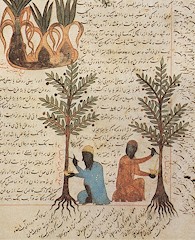Ibn Bassal facts for kids
Quick facts for kids
Ibn Bassal
|
|
|---|---|
| Born | 1050 C.E |
| Nationality | Andalusian |
| Known for | Botany, agronomy, horticulture and arboriculture. |
Ibn Bassal (Arabic: ابن بصال) was a very smart Arab scientist who lived in the 11th century. He was from a part of Spain called Al-Andalus. He was a botanist, meaning he studied plants, and an agronomist, which means he knew a lot about farming and growing crops. He worked in cities like Toledo and Seville, Spain.
Ibn Bassal wrote important books about horticulture (growing gardens) and arboriculture (growing trees). His most famous book is about farming and is called Dīwān al-filāha, which means "An Anthology of Husbandry".
Contents
Life and Work
Ibn Bassal worked for a ruler named Al-Mutamid. This ruler was part of the Abbasid family. For Al-Mutamid, Ibn Bassal helped create a special plant garden in Seville, Spain. It was called the Hā’īṭ al-Sulṭān botanical garden.
Ibn Bassal was originally from Toledo. But in 1085, another ruler named Alfonso VI took over Toledo. After this, Ibn Bassal moved to Seville.
He traveled a lot, even going on a pilgrimage to the Hejaz (a region in Saudi Arabia). During his travels, he visited many places like Egypt, Sicily, Syria, and possibly even countries like Abyssinia, Yemen, Iraq, Persia, and India. When he came back, he brought new knowledge about how to grow cotton. He might have even brought seeds and plants for the botanical garden in Toledo.
Ibn Bassal wrote a book called Kitāb al-Kasd wa 'l-bayān, which is mostly about growing gardens. But he is most famous for his book on farming, the Dīwān al-filāha. He also wrote another book called The Classification of Soils. In this book, he explained ten different ways to describe how good soil was for growing plants.
The Dīwān al-filāha
Ibn Bassal's most important work was his book on farming, called Dīwān al-filāḥa (ديوان الفلاحة). This book was originally a very large manuscript. He wrote it for the botanical garden of Al-Ma’mūn in Toledo. Later, during his lifetime, the book was made shorter and put into one volume. This shorter version was called Kitāb al-qaṣd wa’l-bayān, which means "The Book of Concision and Clarity".
The book was first written in Arabic. But later, in the 13th century, it was translated into Castilian. Many years after that, it was translated into Spanish.
Ibn Bassal's book Dīwān al-filāha is very practical and organized. It seems to be based on his own experiences, as he doesn't mention other farming experts. In the book, he describes more than 180 different plants that people grew. These include:
- Grains and fibers: Chickpeas, beans, rice, peas, flax, sesame, cotton, safflower, saffron, poppies.
- Herbs and spices: Cumin, caraway, fennel, anise, coriander.
- Vegetables needing lots of water: Cucumbers, melons, watermelons, pumpkins, squash, eggplant, asparagus.
- Root vegetables: Carrots, radish, garlic, onion, leek, parsnip.
- Leafy vegetables: Cabbage, cauliflower, spinach, purslane, amaranth, chard.
He also wrote a lot about growing trees (arboriculture). He explained how to grow many different types of trees, such as:
- Palm, olive, pomegranate, quince, apple, fig, pear, cherry, apricot, plum, peach, almond, walnut, hazelnut, grape.
- Citron, orange, pistachio, pine, cypress, chestnut, elm, and ash.
Ibn Bassal also talked about manure and how to make compost. He described manure mixed with straw or sweepings as mudaf. This meant it wasn't just one material (like animal poop) but a mixture. He said that sweepings from hot baths, which included urine and human waste, were dry and salty. He advised not to use them as fertilizer unless they were mixed with other types of manure.
He even gave two recipes for composting pigeon and possibly donkey manure. He said that pigeon dung was very warm and moist. This made it good for weaker plants, especially those that didn't like cold weather. On the other hand, he suggested using human waste in hot weather because it didn't have much heat. He warned that pig dung could harm pastures and poison plants. He also said that compost made without manure, which he called muwallid, was not as good. This type was made with herbage, straw, grass, and ashes from ovens, mixed with water.
Legacy
Ibn Bassal's works were very important. Other scholars studied them many centuries later. For example, Abu Jafar Ahmad Ibn Luyūn al-Tujjbi, who lived in the 14th century, used Bassal's work to write his own book about farming.
See also
- Arab Agricultural Revolution
- In Spanish: Ibn Bassal para niños
 | Bessie Coleman |
 | Spann Watson |
 | Jill E. Brown |
 | Sherman W. White |


